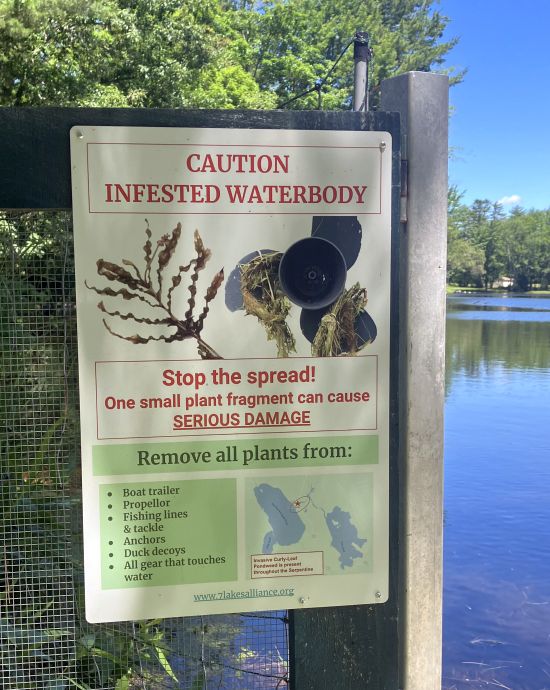
How Safe Is Any Lake From Invasive Aquatic Plants?

In the fall of last year, the worst case scenario of the war on invasive aquatic plants in Maine took place not too far from the Belgrades. When the courtesy boat inspector arrived for the day at the boat launch on Lake Wesserunsett in East Madison, four out-of-state bass boaters had already launched their uninspected boats, presumably before dawn. To put Lake Wesserunsett into perspective, it is roughly a half hour’s drive from Smithfield or Oakland where the two headwaters of the Belgrades are located.
Lake Wesserunsett is known for Lakewood Theater, the longest continuously run summer theater in the nation; the prestigious Skowhegan School of Art; “Lake Wesserunsett Sunset,” a photograph featured in Reader’s Digest and, now, it may be the first lake in the state of Maine to be infested with the invasive aquatic plant fanwort.
Upon inspection of the four trailers, the Lake Wesserunsett Association (LWA) inspector, the local warden and volunteers from LWA found plants hanging off all four. After the boaters returned the plants would be photographed, recorded, collected and bagged, refrigerated over the weekend and mailed to Lake Stewards of Maine (formerly Volunteer Lake Monitoring Program). Unfortunately, one of the plants was fanwort, an invasive so far not found in Maine.
When the boaters returned at 4:30 p.m. they were, according to LWA description, blasé but cooperative, although uncertain where they had been previously, citing out-of-state lakes and possibly one near Augusta. Shortly after the incident, the lake association alerted its members to the potential introduction of fanwort and sent out a flyer published by the Massachusetts Department of Conservation and Recreation. Not unlike with other invasive aquatic plants, fanwort’s impacts on a lake include displacing native species, reducing biodiversity, hampering recreation, reducing real estate values, diminishing aesthetic values and decreasing water quality — certainly something for which lake users should on the lookout.
At the beginning of this year, Warden Jeremy Kemp from the Maine Department of Inland Fisheries and Wildlife traveled to Massachusetts and served summons on the four boaters. Hopefully, they will be fined. More hopefully, the word of the civil charge will deter other potential violators.
What is next for Wesserunsett? What is next for all the lakes and ponds that could be next? What is next for __________? (Fill in the name of a favorite lake.)
On Saturday, July 6, the Lake Wesserunsett Association will hold its annual meeting when an up-to-date fanwort report will be featured on the agenda. All interested and possibly affected parties are encouraged to attend.
On Thursday, July 11, Lake Wesserunsett will hold a a comprehensive Invasive Aquatic Plant survey of the lake under the direction of the Department of Environmental Protection and Lake Stewards of Maine to look for fanwort and other invasives. The survey will begin at 9 a.m. at the East Madison boat launch. Many volunteers will be required to complete the survey in one day.
In October the lawsuit will go to court and is the first case in the state that will go through the fining process. The minimum fine is $500; the maximum $5,000. Publicity surrounding this first-ever case could be helpful to fight against invasive aquatic plants.
In the meantime, the Town of Madison has generously increased its contribution to the boat launch monitoring fund, the Wesserunsett Lake Association has increased the number of hours the boat launch is monitored and every lake lover who enjoys this beautiful, clear, unclogged lake — or perhaps attends a play at Lakewood and enjoys viewing the lake — can hope for the best case outcome.
Download Full Newspaper: High Res | Low Res (Details…)
<— Summaries • Next Article —>
©2024 by Summertime in the Belgrades. All rights reserved.